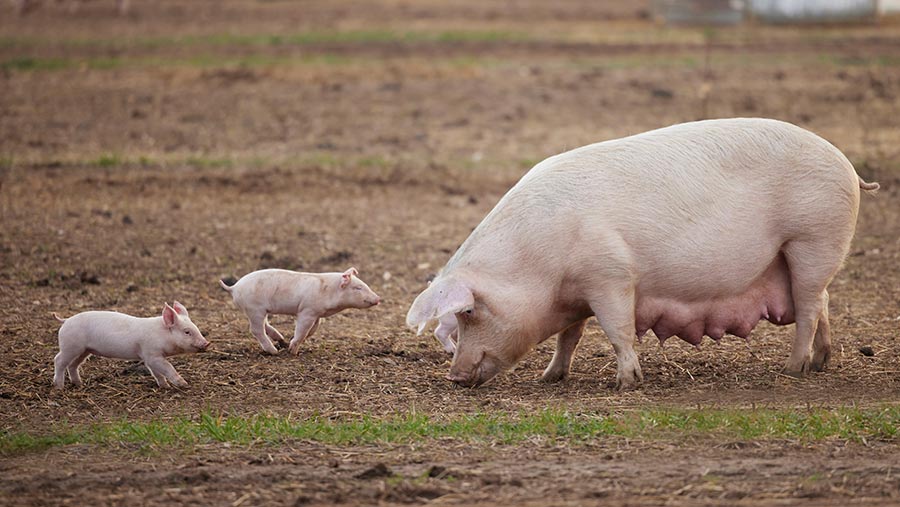Outlook 2024: Pig producers see uplift in fortunes
 © Daisy Daisy/Adobe Stock
© Daisy Daisy/Adobe Stock The past 12 months have seen a change in fortunes with most pork producers reporting positive margins, says Andersons consultant Harry Batt.
While the outlook for 2024 suggests this more optimistic picture should continue, rising costs of production and increased interest rates will create some pressure on profitability.
“This much-needed improvement comes after a crippling three years for the industry, which has witnessed supply chain failures and compounded loss-making for producers.
“Could a corner have finally been turned for UK producers?” says Harry.
See also: How lean management saved pig business £50k
Pigs market summary
- Positive producer margins have made a welcome return
- Rising cost of production and increased interest rates will put some pressure on those profits
- Sales of lower value products have increased and pork joints could replace more costly beef or lamb
- Could pork take further market share from the beef and lamb sectors, given the focus on emissions from ruminant production?
It is no surprise that the cost-of-living crisis is affecting consumer demand for meat, with price highlighted as the key reason for reduced purchases.
As expected, demand for higher value products have been affected as much as any, including outdoor bred and organic pork.
UK per capita pork consumption has fallen over the past 15 years, down 10% compared to its highpoint in 2007. However, we have seen an uptick more recently, while other meat sectors have declined.
Retail data from Kantar shows that sales of lower-value products (sausages, bacon and gammon) are up, with consumers using these products to substitute for more expensive meat cuts.
It is also recognised that these lower-value products can be used in meals that contain fewer ingredients, further reducing price and increasing ease in an age when convenience is key.
“In addition, primary pork is one of the cheapest non-processed sources of protein,” says Harry. “At the time of writing, it is £1.50/kg cheaper than the average non-processed meat.
This could see pork displace beef and lamb in our roast dinners this winter.”
Further opportunity
“Given the focus on emissions from ruminant production, there may be an opportunity for the pork industry to steal further market share from the beef and lamb sectors.
“This would require greater marketing by the supply chain, with companies and farmers working together to promote pork as a healthy, low-cost meat option.
Perhaps the focus should be on greater social media presence and TV campaigns.”
Although some production costs such as feed have reduced, pressures remain elsewhere. Data from the AHDB shows that cost of production is 20-30p/kg above the five-year average.
The key challenges have been labour and electricity costs which, despite an increased focus on improving resource efficiency, have continued to rise on a p/kg basis.
Feed efficiency
However, it remains important to understand feed efficiency as there is still great disparity between producers.
Growers should consider locking into feed contracts as the wet autumn has reduced UK crop plantings, which could push up prices next year, suggests Harry.
“There is also a challenge to understand labour hours/pig place better to ensure efficient labour usage.
“Cost pressures will be compounded by higher interest rates, which are affecting the profitability of all sectors.
“The average cost of working capital has increased from £1.33 to £4/kg a pig (1.52 to 4.55p/kg) in the past 18 months. This will be of great concern for a number of producers who have invested significantly over the past five years.”
Producers are constantly being asked to meet environmental and social targets, but financial sustainability is the key to addressing those aims.
If profit margins are being squeezed, the industry cannot invest the time and capital required, he says.
“The conversation must be driven by the supply chain to highlight that the best opportunity to have environmental, net-carbon-zero pork is by building a profitable industry for all.
“Failure to sustain a UK pork industry will lead to increased food miles, with retailers paying UK landowners to offset the emissions. Is this not a backwards approach?”
Looking ahead for the next 12 months, Harry is cautiously optimistic.
However, he points out that things can change quickly and suggests that many producers across the agricultural industry do not know their cost of production.
“Without that knowledge, informed business decisions cannot be made,” he says
